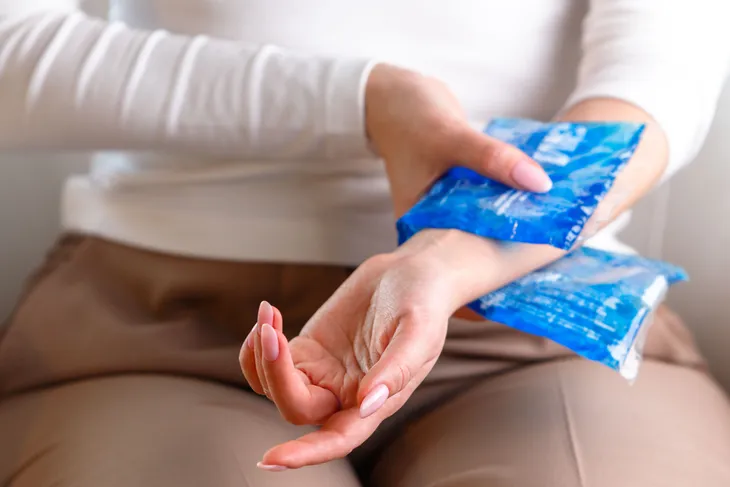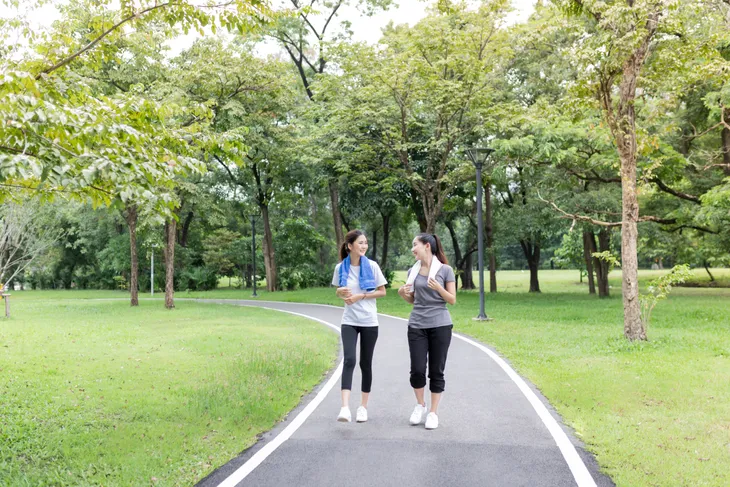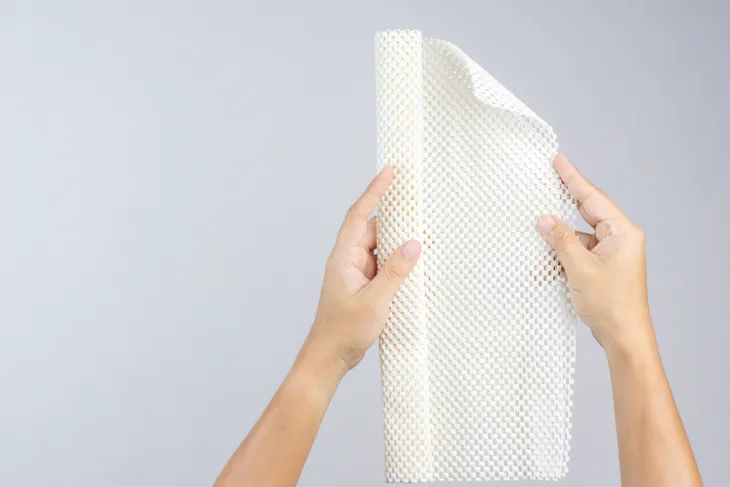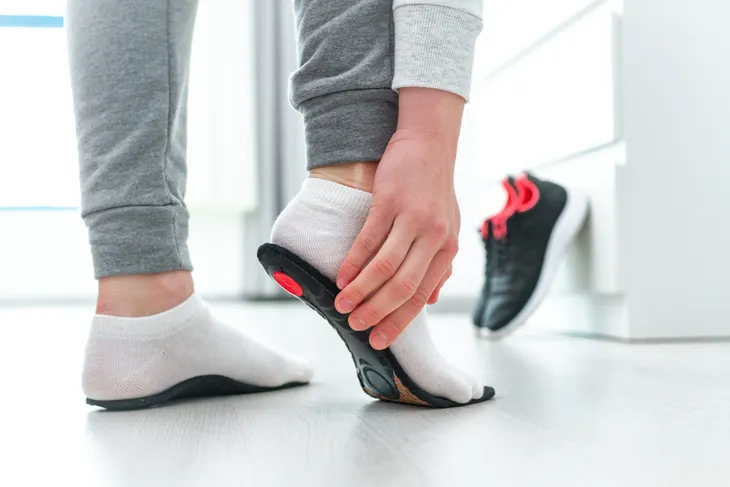- Psoriatic arthritis is a chronic condition that causes inflammation and pain in the joints, making everyday activities a difficult and daunting task.
- While doctor prescribed treatment is best, there are some things that people can do at home to relieve their symptoms.
- Adopting better mental health practices like relaxation, deep breathing techniques, adequate sleep, and simply asking for help can go a long way.
- People with psoriatic arthritis should also invest in their physical health by exercising more regularly, eating healthier, and taking care of their skin.
Psoriatic arthritis is a chronic, inflammatory disease that affects the joints, where the tendons and ligaments connect to bone. It often results in pain, stiffness, inflammation and fatigue. According to the National Psoriasis Foundation, about 30-percent of people with psoriasis will develop psoriatic arthritis.
Following a doctor prescribed treatment plan is essential for managing the symptoms of psoriatic arthritis. However, in addition to therapies and checkups, there are some other things patients can do at home to help manage their flare ups. Here’s a look at 12 life hacks to help manage psoriatic arthritis…
Eat a Well Balanced Diet
We should all try to eat a more balanced diet, but for people with psoriatic arthritis, a change in diet can go a long way in managing symptoms. While there’s no magic cure-all diet, WebMD advises including more lean proteins, fish, vegetables, and whole grains. Drink lots of water throughout the day and limit carbs and sugar.
“We know that patients with psoriatic arthritis are at about three times higher risk for heart disease, stroke, or any kind of cardiovascular event,” says Nilanjana Bose, MD, a rheumatologist at Memorial Hermann Rheumatology Center of Houston to WebMD. People with psoriatic arthritis are also twice as likely to develop type 2 diabetes.
In addition to eating healthier, it might be a good idea to limit alcohol because according to the Arthritis Foundation, alcohol can interfere with some medications and increase the side effects of certain drugs. Consult your doctor to find out if it’s safe to drink while taking specific treatments.
 Shutterstock/Antonina Vlasova
Shutterstock/Antonina VlasovaExercise Often
Exercise on a daily basis is beneficial for everyone, but it’s even more important for people with psoriatic arthritis. Movement keeps the joints loose and limber, as well as ease inflammation and pain, says WebMD. The goal is to build stronger muscles and more stable joints which can ease stiffness. It’ll also help maintain a healthy weight, relieving pressure from painful joints.
“Strength training and low-impact exercises such as walking, swimming, and cycling may be great places to start, especially since they are easier on the joints,” says Haberman to WebMD. Talk to your doctor or physical therapist before starting any new physical activity, particularly if you’ve not been active before. They can help suggest workouts that are most suitable for your needs and abilities.
Reorganize Your Home
We’ve all been spending a lot more time at home which is why many people have begun to invest in making their space more comfortable and desirable. For people with psoriatic arthritis, some small changes can make a big (positive) impact on daily life. For starters, Healthline suggests limiting any clutter in the house like furniture or decor that take up floor space. This will make cleaning and maneuvering around much easier.
Install non skid mats and grab bars in areas like the kitchen or bathroom. Nonskid mats reduce the chance of slipping and falling and grab bars can assist in moving around the house more safely. You might also want to consider easy-to-grip tools and reorganize your kitchen so that everyday items are within reach.
Take Care of Your Skin
When taking a bath make sure the water isn’t too hot but rather nice and warm. You can try using oatmeal, bath salt, Dead Sea or Epsom salts to soothe any irritated spots on the skin, says the Arthritis Foundation.
Take good care of your skin by applying moisturize after showers, baths, or even swimming. Make a habit of using broad spectrum (UVA and UVB) sunscreen of at least an SPF of 30 or higher and wear hats with full coverage. You should also keep nails trimmed nice and short. Wear gloves when cutting them and choose well-fitted shoes that won’t irritate swollen toes, notes the source.
Get Lots of Sleep
Sleep is one of the most important needs for our overall well being, but one we often don’t prioritize. Sometimes it just feels like there’s not enough time in the day! In order to properly manage psoriatic arthritis, adequate sleep is a necessity. Unfortunately, people with psoriatic arthritis tend to be more vulnerable to not getting enough sleep.
“Everyone has a certain amount of ‘reserves.’ When you have psoriatic arthritis and you’re always coping with pain, inflammation, and stiffness, you have less of those reserves, and that means getting a less than perfect night’s sleep can impact you more,” says Ana-Maria Orbai, MD, MHS, an assistant professor of medicine at Johns Hopkins University School of Medicine and director of the psoriatic arthritis program at John Hopkins Arthritis Center in Baltimore to Everyday Health.
We all know sometimes worry and stress can interfere with our ability to fall asleep quickly, so Orbai assures people not to put too much pressure on getting good sleep. “Even if you aren’t getting to sleep right away, sometimes just resting is helping your body recover.” Rest can be more beneficial than good nighttime habits.
Take Breaks Throughout the Day
You’ll thank us for this one later: take breaks throughout the day. They don’t have to be long, even just 5 or 10-minutes will help. The reason for this is to keep stress levels down. WebMD explains that when the body feels stressed, it releases a chemical that causes muscle tension which can make inflammation worse. This will only create more damage and pain in the joints.
“Stress and psoriatic arthritis often create a vicious circle,” says Rebecca Haberman, MD, a rheumatologist at NYU Langone Health to WebMD. “Stress can exacerbate joint pain — even trigger a flare — which then causes more stress, and so on.” Taking breaks throughout the day can help ensure you’re not getting overwhelmed or stressed.
If you’re someone who sits for long periods of time at work or home, breaks are especially important! Again, it doesn’t have to be long. A 5-minute stretch break each hour will keep joints limber and prevent stiffness. Set an alarm to help remind yourself.
Find the Right Footwear
This might seem like an obvious one, but it’s important! Wearing comfortable shoes is essential for people with psoriatic arthritis. Shoes that don’t fit properly can do damage to joints and make any pain even worse. Supportive shoes protect loosened joints and keep them from getting overstrained or even injured, notes Everyday Health.
A good way to gauge if shoes fit properly is by how much room they have at the front, as well as their arch support and cushioning. Avoid high heels or shoes like sandals with no support, says Healthline.
Wear Layers in Cold Weather
Again, this might seem like something everyone should do (and that’s true), but it’s particularly important for people with psoriatic arthritis because cold temperatures can worsen pain and reduce mobility. “It may seem like a small thing, but remembering to wear gloves can be very helpful. They can keep your hands warm and alleviate arthritic symptoms,” says Deividas Jeskevicius, an occupational therapist (OT) at the Kessler Institute for Rehabilitation in Vernon, New Jersey to Everyday Health.
In addition to wearing layers, the Arthritis Foundation also suggests using fragrance-free detergent and fabric softeners to reduce any skin reactions. Clothing should be loose fitting and made of natural, soft fibers like cotton because they can be less irritating to the skin and cooler in warm months. Avoid tight clothing that will put any unnecessary pressure on your joints.
Stretching, Heat and Cold Therapy
Another useful tactic to relieve irritated skin is hot and cold therapy. Make this a part of your daily routine. You’ll notice stiffness is at its peak in the morning and after periods of sitting, says Everyday Health. To combat that, a warm shower first thing in the morning should help start the day! Also, try some gentle stretching exercises to increase range of motion. Aim for 15-minutes of hand stretches each day to keep fingers and joints from becoming stiff.
According to the Arthritis Foundation, you can try heat wraps which help “improve blood circulation and help reduce joint stiffness and muscle spasms.” On the other hand (figuratively, not literally), cold should be applied to aching, swollen joints or burning skin as it will help reduce swelling by restricting the blood vessels.
 Shutterstock/HENADZI KlLENT
Shutterstock/HENADZI KlLENTTry Breathing Exercises
As we mentioned earlier, stress can wreak havoc in people with psoriatic arthritis. An easy way to reduce stress is through meditative practices like deep breathing exercises. To do so, try focusing on breathing through the diaphragm. Even just 10-minutes a day can make a difference, especially if a flare up is on its way.
“To breathe through your diaphragm, you can place one hand on your chest and the other on your stomach while slowly breathing in and out through your nose,” explains SELF. A good way to gauge if you’re doing it correctly is whether or not the hand on your stomach moves.
Find a Supportive Community
A common emotion among people with chronic health conditions like psoriatic arthritis is isolation. They aren’t able to move through life as freely and easily as others and it can sometimes feel like no one understands. A great way to combat this is to find a supportive community that gets it.
This could be a local support group or even an online one. Anything that provides a space to connect with others and offers some much needed support and understanding. You can find online communities on Facebook by searching “psoriatic arthritis” in groups or through the hashtag #psoriaticarthritis on Instagram. Another great resources is the National Psoriasis Foundation and the Arthritis Foundation who offer access to support groups and virtual events.
Ask for Help When Needed
A lot of people struggle when it comes to asking for help. It’s natural! But there’s nothing to be ashamed of, especially for people who really need it, like those with psoriatic arthritis. Daily tasks and chores like running errands and cleaning can sometimes be a struggle, so don’t be afraid to ask for help from family and friends.
Relying on others from time to time isn’t a defeat, it’s allowing yourself the ability to rest and heal. You can’t do it all and that’s okay! We’re all human and we each have our limits. Knowing your limits and when to ask for help is a strength, not a weakness.













